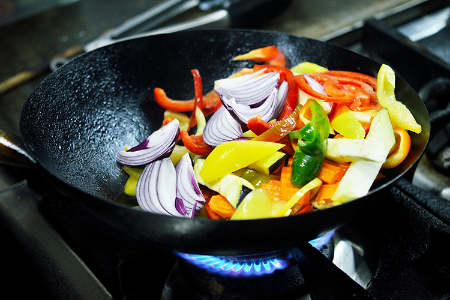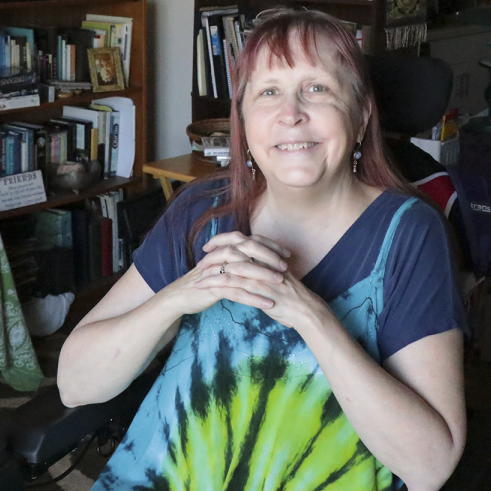A Rolling Perspective: What's On The Menu?

Only the most patient of persons would dare take me to a restaurant. I pore over the menu, imagining how each dish would taste. I engage in cost-benefit analyses, as in “is it worth an extra two dollars for the guacamole?” I agonize about the effect my choice may have on the budget of the kindly person who brought me to this magical place full of food. Because I prepare nearly all my own meals from scratch, I know what it costs to make each meal. Sometimes I’m so shocked at what the restaurant’s charging, I have trouble enjoying it when it arrives. I think instead of the bills I could pay with that money, or the shoes I could get, or the book I could afford at last.
If you’ve experienced poverty up close and personal, you totally get it. Eating out simply hasn’t been on my menu for years. When someone does take me to a restaurant, an internal voice kicks in to remind me I may never get the chance again, so I’d better make the most of it. “What’s rare is wonderful,” the Irish say. I agree, and would add that rarity causes heightened awareness and leads to choices that align better with our highest priorities.
We all know people who dine out frequently in sit-down, “fancy” restaurants. We wish we had that kind of money. But businesspeople and office workers with an hour for lunch visit delis and sandwich shops too, day in and day out. And how about those coffee, tea, and other beverage fixes? They eat a large chunk of the budget, but routine blinds us to their cost.
I’ve noticed also that despite myriad menu items, most people opt for the same thing every time. Adventurous types who try new dishes tend to either have more money or less anxiety over spending it. If they don’t like something, they just won’t order it again. No big deal. Those with slim wallets, however, take the safe option: “better the deviled egg you know,” even if you don’t care for it all that much.
How do you get yourself out of the Food Ruts? Here are some ideas:
- Do the “Get the Popcorn” financial awareness exercise outlined in last month’s article. Once you’ve done it, you’ll never shop for food (or anything else) in the same way again.
- Notice your food routines. People are fond of saying their jobs are boring, or their coworkers are boring, or their lunch is boring. The “boring buck” stops with you! You must choose to break those routines, and the easiest place to start is lunch. No one ordered you to have the same thing every day. Or did they? Are you attached to a story about food that is no longer valid?
- Does it matter with whom or where we eat? The French have a saying that there’s nothing sadder than seeing someone eat on their own, but I’m not sure I agree. My meals are solitary but joyful affairs. I concentrate on each flavor and texture; I imagine the vitamins and minerals going where they’re needed; I fully appreciate every bite. If I do dine with family or friends, I tend to eat (and talk) too much, which interferes with my digestion.
- Anger/Trauma: And what if the mood at the table is anger? Early traumas involving food mean the dining experience, for me, produces severe anxiety. For those who have had bad news broken overdinner or been through unhealthy judgements at the table, the meal may come with some emotional baggage. TV ads never show that; they serve up the “happy families at the dinner table” myth like it’s something normal, but is it? Don’t they just want you to buy the food they’re advertising, the intimation being that if you buy their brand you, too, will have a happy family or a romantic dinner partner? Discover whether this is true for you before you swallow those myths whole.
- Speaking of TV… do you eat in front of it? Do you or your family have the TV on near the dining area? Don’t chastise yourself, just notice. Eating in front of a TV (or even a book, for that matter) demolishes mindfulness. We love to think we can “multi-task,” but humans are not really good at it. We end up doing several things poorly instead of one thing well. Imagine ordering a gorgeous meal and then, instead of enjoying each item as intended, you mixed them (including dessert) into one mass. Same food, yes. But taste-wise? Not the same.
- Don’t eat and drive. Not a good idea on several levels, but if you’re so busy you eat while you drive, then you’re too busy. Make different choices; you’re in the driver’s seat. Get up earlier and plan a little quality time, just you and your nourishment. Notice your increased energy levels (and bank balance) after even a few days of mindful eating.
The world is full of menus, links, and options: smartphones, computers, election ballots, online forms, blogs, restaurants. We may want everything on them; we may want none. In reality, we can only effectively link to one thing at a time in any given moment—whether it’s food, family, friends, or fun. Why not choose mindfully?
Recently I put this insight into action. I told my granddaughter and her friend they could only watch one more music video. Further, they both had to agree on it. Well, you should have seen them! Knowing they had only one choice left, they carefully went through the playlist, doing a first-grader’s version of a cost-benefit analysis. In the end, because they couldn’t agree, they didn’t play a video. Instead, they chose an entirely different, more healthful activity: they went outside (in the rain) to create meals for the fairies they’re convinced live in the garden.
I’m not sure about fairies, but humans have magical powers, if “magic” means the ability to transform. If we blend our highest priorities with generous dollops of awareness, heaping tablespoons of self-love and acceptance, and a pinch or three of laughter, we will produce—made to order—an oh-so-light, delectable Life. Bon appétit!
Resources
If you miss the dining-out experience, there are low- and no-cost places to do so. Senior Centers offer full accessibility, of course, but you may wish to check the others. Also, low-cost meal providers use volunteer staff, so if someone calls in sick, meals may not be provided. Always check first. (Or become a volunteer yourself!) Remember, too, that public transport is rarely available on major holidays.
- Check out the Utah Senior Center directory.
- The Utah Department of Aging and Adult Services offers information on nutrition, Meals on Wheels, and resources for healthy living.
- Find your local Utah soup kitchen, food pantry or food bank.
Jennifer Holland taught herself to read and write at age four and has been doing both ever since. Minnesota-born and Wisconsin-bred, she nonetheless inherited the Irish perchant for travel. Despite the shoestring budget, she visited a dozen countries before her diff-ablement, and even lived in Ireland for nearly fifteen years. Her encounters with other cultures inform the quirky insights into human behavior that find their expression in her poetry, novels, and non-fiction works. When she's not reading or writing, she enjoys chair yoga, video chats with her children and gradchildren, and living happily with MS on a tiny fixed income.


